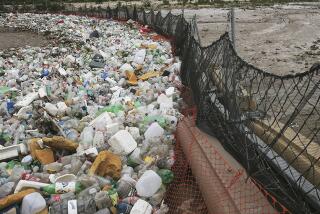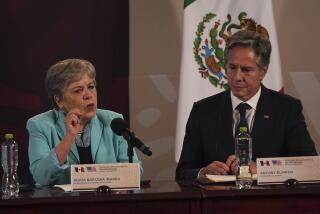It Costs Money to Be Clean
Mexico faces a daunting challenge in cleaning up its environment as it moves toward a free-trade agreement with the United States. As a recent series in The Times showed, Mexicans are already painfully aware of the enormous amount of self-inflicted damage that has been done on the road from a Third World nation of poverty to one of increasing industrialization.
Even as President Carlos Salinas de Gortari aggressively promotes free-market economic policies, he makes pointed--and substantive--gestures to show he is an environmentalist. He has, for instance, shut down government oil refineries and ordered his country’s tuna fleet to protect dolphins. And he’s not doing this just because environmentalists are among the harsher critics of his free-trade plan. He knows Mexicans want a cleaner environment--and want their government to get the job done.
The U.S. Environmental Protection Agency will work closely with the Mexican government to provide whatever technical aid it may need to better regulate pollution and decrease it to U.S. standards. EPA’s specialists have found that Mexico’s top environmental officials are every bit as competent and dedicated as their U.S. counterparts. What Mexico needs are skilled officials and specialists at the lower levels. Right now, it does not have the resources to train such experts, provide technical support and compensate them enough to make them resistant to bribes or other inducements to look the other way when they find pollution.
Mexico will never have those resources without new wealth. The quickest way to generate wealth is to open up Mexico to more economic development by Mexican entrepreneurs and by U.S. and Canadian investors. Arguing for strict environmental controls in Mexico before a free-trade pact is in place is akin to putting the proverbial cart before the horse. The political will to clean up pollution exists; the question is not whether Mexico wants to clean up its act, but how. A free-trade pact is part of the answer.
More to Read
Sign up for Essential California
The most important California stories and recommendations in your inbox every morning.
You may occasionally receive promotional content from the Los Angeles Times.










